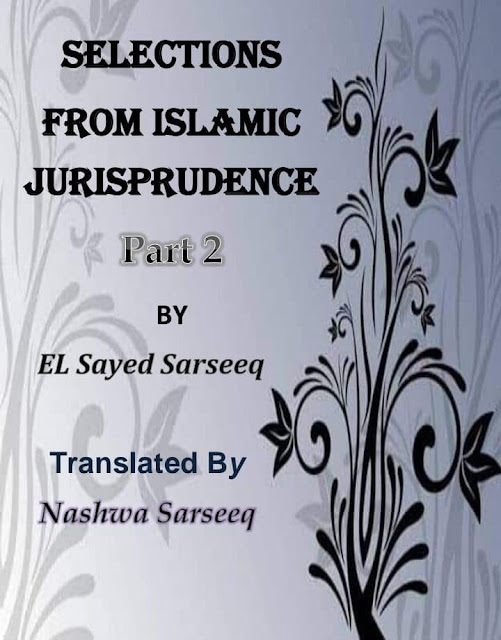Sources of Legislation
in Islam
[The
Holy Qurᶦan, the Prophetic Sunnah, Analogy (Qiyaas), and Juristic
Deduction (Ijtihaad)].
Introduction:
Every legal
decision (For example: lawful, prohibited, allowed, etc…) and every legislation
must be based on an evidence from the Holy Qurᶦan.
If this evidence
is not found in the Holy Qurᶦan, scholars search for it in the Prophetic Sunnah
(a saying, an act, or a tacit approval) concerning this situation.
If this also is
not found, we use “analogy” which means searching for a similar situation that
occurred in the time of the Prophet.
If this also not
obtained using analogy, a jurisprudent uses juristic deduction, if only he is
eligible to do so, in order to conclude a legal decision which is suitable to
the objectives of Islamic Law.
Legal decisions
have frequently been derived from the Holy Qurᶦan and Prophetic Sunnah,
especially in obligations and pillars, so the Prophet has emphasized them.
●ᶦIrbaad ibn Sariyah (May Allah be pleased with him)
reported: The Messenger of Allah said: “Verily
he among you who lives long will see great discord, so you must keep to my
Sunnah and the Sunnah of the Rightly- Guided Caliphs (AL-Khulafaa
Ar-Rashideen), those who guide to the right
way.
Hold fast to it [literally: cling to it with your molar teeth].
Beware of
newly invented matters [in the religion],
for verily every innovation (Bidᶦah) is a misguidance.”
Reference: 40 Hadith Nawawi
28
Note that:
The Rightly-Guided Caliphs are Abu Bakr As-Sideeq, ᶦUmar
ibn AL-Khattab, ᶦUthman ibn ᶦAffan, and ᶦAli ibn Abi Talib.
●Yahya related to me from Malik that he heard that the
Messenger of Allah, may Allah bless him and grant him peace, said, “I have left two matters with you. As long as you hold to them,
you will not go the wrong way. They are the Book of Allah (the Holy Qurᶦan) and the Sunnah of His Prophet.”
Reference: Muwatta Malik- The Decree. Book 46, Hadith 1628
***************************************************************
The Book of Allah
and the Sunnah
Examples
for them:
¨Pilgrimage
is a pillar and an obligation.
From
the Qurᶦan: ﴾And [due] to Allah from the people is a pilgrimage to the House- for
whoever is able to find thereto a way﴿
Chapter of the Family of ᶦImran.
From the Sunnah
(As a saying):
●Abu-Hurairah (May Allah be pleased with him) reported:
The Messenger of Allah (P.P.B.U.H) delivered a speech and said, “O people! Hajj has been made obligatory for you,
so perform Hajj.” [Muslim].
(As
an act):
●Narrated
Qatadah: I asked Anas, “How many times did the Prophet perform Hajj?” He
(Anas) replied, “Once.”
……………………………….
¨Sacrifice
is slaughtered after the prayer of Sacrifice Festival (ᶦId AL-Adha).
From
the Qurᶦan: ﴾So pray to Your Lord and sacrifice [to
Him alone]﴿ Chapter of
AL-Kawthar. Verse NO 2
From
the Sunnah:
●Narrated AL-Baraᶦ:
I heard the Prophet (P.P.B.U.H) delivering a speech saying, “The first thing to be done on this day (the
first day of the Festival of Sacrifice) is to
pray; after returning from the prayer
we slaughter our sacrifices (in the name of Allah) and whoever
does so, he acts according to our Sunnah.”
Reference:
Sahih AL-Bukhari 951 Book 13,
Hadith 3
……………………………….
¨Prohibition
of wine.
From
the Qurᶦan: ﴾O you who have believed, indeed, intoxicants, gambling, [sacrificing on] stone alters [to other than Allah], and divining arrows are but defilement from the work of the Devil, so
avoid it that you may be successful﴿
Chapter of the Table. Verse NO 90
From
the Sunnah:
●Abu Saᶦid AL-Khudri (May Allah be pleased with him) reported: I
heard Allah’s Messenger saying, “Verily Allah,
the Exalted, has forbidden wine. So who hears this verse and he has anything of
it with him, he should neither drink nor sell it.”
Reference:
Sahih Muslim 1578 Book 22, Hadith
82
……………………………….
There are many
other such examples.
Sometimes legislation
comes from the Prophetic Sunnah only. And this occurs according to God’s saying
﴾And whatever the
Messenger has given you- take, and what he has forbidden you- refrain from. And
fear Allah; indeed, Allah is severe in penalty﴿
Chapter of the Gathering.
Analogy
It is appending a matter, for which there is
no text in the Qurᶦan or the Sunnah, to another matter for which there is a
text in the Qurᶦan or the Sunnah. This is done when the two matters have the
same rationale for this legal decision.
The Prophet has approved analogy as a source
of legislation.
●Narrated Ibn ᶦAbbas:
A woman from the tribe of Juhaynah came to the Prophet and said, “My mother had
vowed to perform pilgrimage but she died before performing it. May I perform
pilgrimage on my mother’s behalf?”
He replied, “Yes!
Perform pilgrimage on her behalf. If your mother had been in debt, would you
have paid her debt or not? So, pay Allah’s debt as He has more right to be
paid.”
Reference:
Sahih AL-Bukhari 1852 Book 28,
Hadith 32
Also the
Prophetic tradition:
●Allah’s Apostle
said, “Every intoxicant is wine (Khamr), and every wine is prohibited.”
Reference: Sahih Muslim 2003d Book 36, Hadith 95
According to the previous tradition, the logic analogy
prohibits everything causes intoxication, no matter how many names are, like:
whiskey, champagne, brandy, etc…
Whiskey causes intoxication, and everything causes intoxication
is prohibited. Thus whiskey is prohibited.
-----------------------------------------------------
Juristic deduction
It means that a jurisprudent or a jurisconsult makes an
effort in concluding a legal decision for a case that is not provided in the Qurᶦan
or the Prophetic Sunnah and there is no similar case has occurred during the
life of the Prophet and his Right Guided- Caliphs.
Conditions in
which juristic deduction is allowed:
1) When there is no text in the Book or the Sunnah.
2) When there is a text but with no decisive proof.
Conditions of the independent jurist (who uses juristic
deduction):
❶ He is a Muslim.
❷ He memorizes the Holy Qurᶦan perfectly.
❸ He is familiar with a number of the Holy Qurᶦan interpretations.
❹ He has studied the Prophetic Sunnah [traditions’ chains
of authority (Sanad AL-Hadith) and traditions’ texts (Matn
AL-Hadith)]. Also, he is aware of the true, weak, and fabricated
traditions.
❺ He is an expert in jurisprudence principles, basics,
and legal decisions. Also, he is familiar
with the issues upon which there has been a consensus of the previous jurists.
❻ He is familiar
with grammar, morphology, and vocabulary of Arabic Language.
❼ He consults a
number of scholars regarding his opinion.
❽ Mental ability
to balance between matters.
❾ He is quick-
witted when he receives questions.
❿ He is familiar
with people’s living conditions.
Legitimacy
of juristic deduction
●Some companions
of Muᶦadh ibn Jabal said:
“When the
Messenger of Allah intended to send Muᶦadh ibn Jabal to the Yemen, he asked: ‘How will you judge when the occasion of deciding a case
arises?’
He replied: ‘I shall
judge in accordance with Allah’s Book.’
He asked :‘(What
will you do) if you do not find any guidance in Allah’s Book?’
He
replied: ‘(I shall act) in accordance with the Sunnah of the Messenger of
Allah.’
He asked: ‘(What will you do)
if you do not find any guidance in the Sunnah of the Messenger of Allah
and in Allah’s Book?’
He replied: ‘I shall do my best to form an
opinion and I shall spare no effort.’
The Messenger of
Allah then patted him on the breast and said: ‘Praise
be to Allah Who has helped the
messenger of the Messenger of Allah to find something which pleases the
Messenger of Allah.’”
Reference:
Sunan Abi Daoud 3592 Book 25, Hadith
22
Note Muᶦadh
ibn Jabal was eligible to be an independent jurist.
●It was narrated
from Anas ibn Malik that the Messenger of Allah said: “The most knowledgeable of my nation concerning the
lawful and unlawful is Muᶦadh ibn Jabal.”
Reference:
Jamiᶦ AL-Tirmidhi. Chapter on Virtues.
¨When
ᶦUmar ibn AL-Khattab appointed “Shuraiyh ibn AL-Harith” to be the judge of
AL-Kufah, he said to him, “Refer to the thing that appears to you in the Book
of Allah and do not ask anyone about it. When it does not appear to you in the
Book of Allah, then follow the Sunnah of Allah’s Apostle in it. When it does
not appear to you in the Sunnah, then make your independent juristic decision
in it and consult scholars and righteous people.”
A juristic
rule: No juristic deduction in the presence of a
text.
We have
previously mentioned that the Book and the Sunnah are the main sources for
concluding a legal decision. So, when an evidence is found in both of them or
in one of them, then no juristic deduction in the presence of a text.
For example:
God
says ﴾And for you is half of what your wives leave if they have no
child. But if they have a child, for you is one fourth of what they leave,
after any bequest they [may
have] made or debt﴿
It
is an explicit provision in Chapter of Women in distribution of inheritance, so
it is prohibited for any independent jurist to submit an opinion that violates
it.
Respecting the text, which is present in the Book and the Sunnah, appears
clearly in the Battle of Badr:
The
Prophet took a place where he gets ready to meet Quraysh.
Then, AL-Hubab ibn
AL-Mundhir said to him: “Has God chosen this place for you, so that we cannot
move forward or backward from it, or it is the opinion, the war, and the
deceit?”
The
Prophet said, “Indeed, it is the opinion, the
war, and the deceit.”
AL-Hubab
said, “O Messenger of Allah! As it is not a place (that Allah defined for you),
lead people to move till we reach the nearest (well) of water and stay at it. Then,
we make water more sunken in the other wells.
As a result, we can drink water
but they (our enemies) cannot drink it.
The Prophet said, “You have expressed the (wise) view.” Then,
the Prophet got up and moved with his army according to AL-Hubab’s advice.
Note that:
The water of Badr is a creek that flows in the plain of Badr, then it disperses
in several wells.






